高职国际英语1 unit 1
高职国际英语第1册unit1

China India it is join the hands with palms together and smile. In Japan usual bow from the waist and lower the eyes. the West to shake hands and smile. parts of Asia
Book 1
Book Rally
Directions: Skim through the book and find the answers to these questions.
1. What team sport can you see in unit 5?
B_a_s_k_e_tb_a_l_l,_p_a_ge__6_6_. _________________________
_W_i_n_g_K_e_i W__o_n_g_. ____________________________
7. What is the name of the girl who was bullied to death?
P_h_o_e_b_e_P_r_in_c_e_,_p_a_g_e_7_7_, _u_n_it_5_._________________
Two Chinese men
is
Two Japanese women are
Two Americans
bowing from the waist. joining her palms together and smiling. shaking hands and smiling.
Book 1 Unit 1 - People Focus
Unit 1 Going to College_高职高专英语
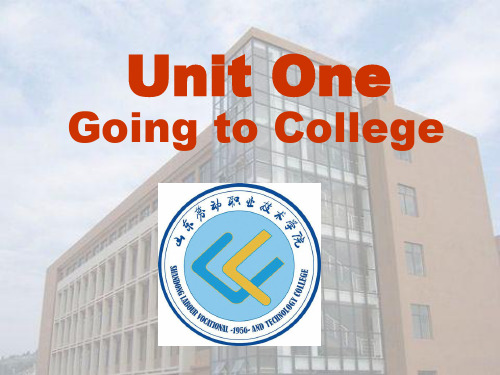
8. cheat: v. behave in a dishonest or deceitful way in order to win an advantage, especially in a game • He was caught cheating on the exam. n. a person who cheats • Cheats won’t obey rules they are supposed to obey. 9. be true of: valid or relevant for (someone) • That is not true of the people I am talking about.
2. on one’s own: alone; without help • I can’t carry it on my own; it’s too heavy 3. decide on/upon: choose (someone, something, or doing something) • We decided on the blue paint for the bedroom. 4. keep up: 1)remain level; remain as high as • She had to run to keep up with the other girls. 2)(cause to) remain high • Prices have kept up all the year. 3)continue (something) • I have kept up a friendship with a girl when I was at school twenty years ago.
高职高专英语1-unit1 Starting College Life
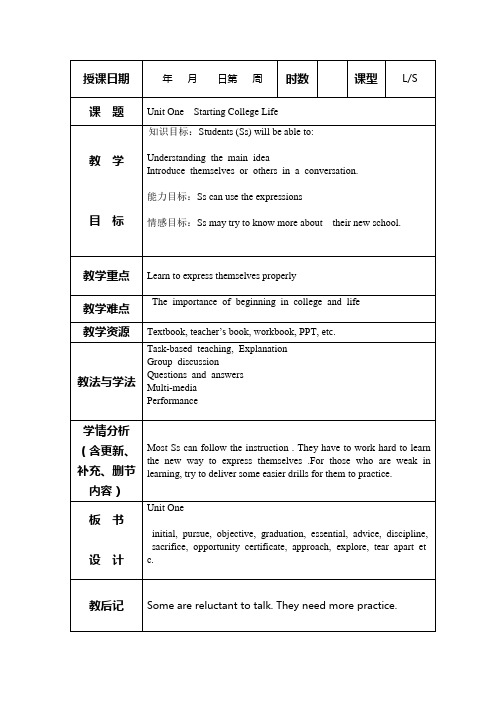
师生活动
1. Lead-in questions:
What do you expect to learn at college?
What kind of life did you expect to have before you came here?
What do you expect to learn? More book knowledge or more practical social experience?
•Where are you from?
•What are your expectations of college life?
•What kind of changes do you think it will bring upon your life?
2) Information related.
1)The teacher asks the following questions:
What’s college life like in your eyes?
Do you think there are any differences between college and high school?
能力目标:Ss can use the expressions
情感目标:Ss may try to know more about their new school.
教学重点
Learn to express themselves properly
教学难点
The importance of beginning in college and life
高职国际英语Book1_Unit1

Unit 1 - People
People and issues – Text (A)
Text study
Background information Words and expressionsFra bibliotekText
Looking at the text
Working with words Speaking
Listening
Grammar
Nouns:
details
Project: A leaflet for foreign visitors on
Countable and uncountable nouns Making uncountable nouns countable Using irregular plural forms
Looking at the text Working with words
Book 1
Unit 1 - People
Brief summary of the unit
Topics
Greeting people for the first time Greeting people you already know Introducing yourself and others Saying goodbye Shaking hands Forms of address
Unit 1 - People
What can you see in the photos?
An Indian woman Two Chinese men Two Japanese women Two Americans
is are
bowing from the waist. joining her palms together and smiling. shaking hands and smiling.
高职国际英语1 unit 1

Unit1People1.Warmingup:Usingthephrases“Howdoyoudo?MynameisNicetomeetyou.”writtenontheboard.2.Focus:Thestudentsareshownpicturesofpeoplemeetingforthefirsttime.Theyarealsosuppli edwithadialoguewhichtheycancopytosaywhattheydowhentheymeetsomebodyfor thefirsttime.Theyjointheirhandsatpalmsandsmile.Theyshakehandsandsmile. Theybowfromthewaistandlowertheireyes.Askstudentsto:1)Matchnationalitieswiththepictures:whichpictureshowsanIndianwoman?WhichpicturesshowstwoJapanesewomen?WhichpictureshowstwoAmericans?Whi chpicturesshowstwoChinesemen?2)Actoutoneofthesegreetingsinclass.Theotherstudentsmustguesshowtheyaregreetingeachother.Areyoubowingfromthewaistandloweringyoureyes?Areyous hakinghandsandsmiling?3)Tellhowtheygreeteachother?Howtheygreetolderpeople?Howtheygreettheirteachers?Howtheygreettheirparentsandotherrelatives?Andactingoutthesediff erentwaysforgreetingpeople.3.TextA:greetingandintroducingpeople1)Newwordsreading2)Askstudentswhattheycanseeinthepictures,howoldtheythinkthepeopleare,whatkindofoccasionitcouldbeandiftheyhaveabarbecueathomeandwhattheybarb ecue.3)Askstudentstoreadoutthetextloudparagraphbyparagraph.Collectanywordswhichstudentshavedifficultypronouncing.Writingthesewordsontheboard.Make alistontheboard.Thenrepeatthewords.4)Askstudentsthefollowingquestions:Howtogreetanolderpersonwhenyoumeethimforthefirsttime?Doyoushakehandswithanolderperson?Doyousmileatanolderperson?Howdoyouintroduceyourselftoanolderperson?Whatdoyousaytoayoungerperson?Howdoyouintroducesomebodyelsetoayoungerperson?Whatdoyousaytosomebodyyoualreadyknow?Howdoyouanswerayoungerpersonyouknowwhogreetsyoufirst?5)PairworkasKateMillerandSungLingstartingfromline17.6)Page5-1:readoutthesentencesandthenpairthem.7)Page5-2:checkthemeaningofthewordsbeforedoing.4.Backgroundinformation:1)studentexchange:increasestudent'sunderstandingandtoleranceofotherculture s,aswellasimprovingtheirlanguageskillsandbroadentheirsocialhorizon.2)Barbecue:anoutdoormeal,usuallyaformofsocialgatheringatwhichmeats,fish,orf owl,alongwithvegetables,areroastedoverawoodorcharcoalfire.5.wordsandexpressions:1)exchangepartner2)BowTheybowedlowtothechairman.Heturnedandbowedtohisboss.BowandarrowsHetookbowonstagetoaudience.3)Next-doorneighbor4)LimpLimphandshakeSheletherwholebodygolimp.Maryhadtwistedherankleandwaslimping.一瘸一拐5)Friend--friendlyunfriend--unfriendly--unfriendliness6)Informal--informally--informality7)Shortperiod8)Formal--formally--formality9)Hadbetterdo10)Informalformalnaturalpersonalprofessionaladditionaleducationalmusicalact ualofficialregionalindustrialinternationalmedicaltraditionalculturalpracticalPage7listening1:Beforeplayingtherecordinggetstudentstoreadthesentences1to6,firstquietlytothe mselves,thenaloud.Makesurethateverybodyhasunderstoodthesentences.Nowplaytherecordingandgetstudentstodotheexercise.Bepreparedtoplaytherecor dingasoftenasthestudentsneedit.Patrick:goodmorning.Excuseme,butareyouMsSusanGarnerfromChicago,pleaseSusan:that'sright.Patrick:howdoyoudo,MsGarner?I'mPatrichChoy.It'snicetomeetyou.I'vecometota keyoutoyourhotel.Susan:howdoyoudo,MrChoy.It'snicetomeetyou,too.Look,mayiintroduceyoutoone ofmycolleagues?ThisistonyHunter.Tony,thisisPatrickChoy.He'scometotakeustoo urhotel.Tony:Fine.Howdoyoudo,MrChoy?It'sapleasuretomeetyou.Patrick:Howdoyoudo,MrHunter.WelcometoHongkong.Tony:Thankyou.I'veheardsomanygoodthingsaboutHongkongthatit'swonderfulto behere.Patrick:that'snicetohear.Now,couldyoucomethisway,please?Thecar'sjustoutsidet hebuilding.It'snotfar.Askstudentstoreadoutthesentencesandsaywhethertheyaretrueorfalse.TextB:BlindDate1.Backgroundinformation:1)Blinddate:itusuallyoccurswhenthetwopeoplepreviouslynotknowingeachotheraregoingoutonadatesetupbyanotherpersonwhoknowsbothpeople.Today,m ostblinddatesaren'ttotallyblindperse,thankstoonlinesocialsitessuchasFacebo okandMySpace,wheremanypeoplehavephotographsofthemselvesthatareea silyaccessiblebyothers.2)Geocaching地理寻宝游戏:isahightechversionofhideandseekandanoutdoorrecreationalactivity,inwh ichtheparticipantsexploretheoutdoorsinsearchofhidden“treasure”andadven turebyusingaGPSreceiverormobiledeviceandothernavigationaltechniques.2.Wordsandexpressions:1)Internetdatingsite2)Icouldnotbelievemyeyes.3)ShebeganmodellinginParisaged15.4)Glamour--glamorous5)Suit--suitable6)Allthegirlsfanciedhim.Lindatookquiteafancytohim.Whatdoyoufancydoing?Ijustfanciedadrink.7)tongue-tied8)Agenerousglassofwine一大杯酒;generosity大量充足9)Tipthewaiteradollar10)Stripedtie条纹领带11)TieupyourshoelaceItiedaknotintherope.12)ican'tstand.13)Ignore--ignorant--ignorance14)Beinnomoodfor.../todo...没心情做某事Beinthemoodfor../todo...有心情做某事Beinamood情绪不好15)misery--miserable--miserably16)Regret--regrettable--regrettably17)Straightaway马上18)Hopefully但愿19)Strikeupaconversationwithsb.搭讪攀谈strick--struck20)Beinconversationwithsb.正在谈话21)Makeconversation搭话找话说说应酬话。
高职英语第一册unit 1

Unit OneWhy College?ⅠWarm-Up Activities1. Listening: (Listen to the summary of the text made by you or news related to the text and then answer the following questions. In case of meeting some new words, write them down on the blackboard and give some brief hints.)2. Interview:3. Discussion: (It allows the students to work in pairs or small groups to discuss the following questions.)1) What’s the advantage of going to college?2) What’s the disadvantage of finding a job after high school?3) Give your opinions.4. Report:Look at the title.Why college?Do you know what college is?Well you are college students. Well if someone ask you, what’s your major? How to answer? You should say I’m Sports majors. Sports majorDegreeBachelor degreeMaster degreeWhy you come to college?For a better life, right?Diploma 文凭After you graduate from school you will start your career.Entertainer 演艺人员Entrepreneur 企业家Executive 管理人员Athlete 运动员ⅡVocabulary StudyRead and explain some useful words or phrases.o advanced:e.g. Most people find her advanced ideas difficult to accept.o beyond: outside the range ofe.g. The car is beyond repair.------ Can you give me a hand?_____ Sorry, it is beyond me.o dominate: v. have power and control overe.g. Much of my spare time seems to be dominated by housework.Sports, and not learning, seem to dominate at that school.o entertainer:eraser, erector, director, computer, weedier, viewer, and so on.o faith: (in)e.g. Have you any faith in what he says?o major: n. chief subject at collegee.g. Business English is my major at college.adj. chief or importante.g. Guangzhou is one of the major cities of China.v. specialize ine.g. He majored in two subjects at CambridgeUniversity.o outearn: v. earn more thane.g. Tom outearns his father.out: surpassinge.g. outgo, outgrow, outlook, outliveo view:v. see or regard or think ofe.g. We will go and view the house before we buy it. ( inspect)He was viewed as the best candidate for this fob. (think of sb. as)II. Text Presentation and Language Points1. The more you learn, the more you earn.This is a structure used to show that two things happen together.Examples:A. The more practice you have, the fewer mistakes you will make.B. We'll have to begin our journey early tomorrow; in fact, the earlier, the better.C. Actually, the busier he is, the happier he feels.D. The more I read the poem, the more I understood it.2 .... as she accepted her high school diploma.diploma: a certificate of graduation from a school or collegeExamples:A. He received a diploma from Harvard in 1978.B. She worked hard to earn her music diploma.3. Although Cyndi made it without a high school degree, most people don't.make it: be successful (in one's career, etc.)Examples:A. He failed to make it as a writer.B. It's hard to make it to the top in show business.4. In the U.S.A. today, about 75% of jobs require some education or technical training beyond high school degrees; college graduates outearn those without a college education;...1) require: needExamples:A. What do you require of me?B. They required me to be quiet.C. It is required that the instrument should be tested before it is actually used.2) beyond: outside the range ofExamples:A. The car is beyond repair.B. Your work is beyond all praise.C. They're paying $100,000 for a small flat it's beyond belief.3) outearn: earn more thanExample:Tom outearns his father.4) out-: to a greater extent; surpassing, such as outdo, outlive, outnumberExamples:A. Jim outlived his wife by five years.B. John was unable to outdo his elder brother at tennis.C. The teenager outgrew his shoes in four months.D. Our army outnumbered the enemy's troops.5. Many skilled blue-collar workers, salespeople, business executives, and entrepreneurs outearn college professors and scientific researchers.executive: person or group in a business organization with administrative or managerial powers Example:I would like to apply for the position of sales executive.Lines 13 176. But a college education is not only preparation for a career; it is also (or should be) preparation for life.career: job or professionExamples:A. People choose their careers for many reasons.B. A r6sum6 always includes a description of your career objectives.7. In addition to courses in their major field of study, most students have time to take elective courses.1) in addition to: as well as; besidesExamples:A. In addition to giving a general introduction to computers, the course also provides practical training.B. We saw a Mickey Mouse cartoon, in addition to the cowboy movie.2) major as an adjective: greater or more importantExample:A. Cigarette smoking is a major factor contributing to cancer.B. Chicago is one of the major cities of the United States.major as a noun: a chief or special subject at a universityExample:She chose economics as her major.major in: specialize in (a certain subject) at college or universityExample:Helen majored in two subjects at the University of Maryland.8 .... or whatever else interests them.whatever: (used as pronoun or adjective)Examples:A. Whatever happens, don't forget to write to me.B. You can take whatever book you like on the bookshelf.9. But recent high school graduates no longer dominate the college campuses.1) graduate as a noun: person who has completed a course at a college, school, etc.Example:College graduates in China are now-ready to accept lower-paid jobs.graduate as a verb: complete an educational courseExample:He graduated from Oxford ten years ago.2) dominate: have power and control overExamples:A. He completely dominated the group and made all the decisions.B. Thanks to his strong personality, John dominated the new committee.3) campus: the grounds of a school, college or universityExamples:A. Freshmen are required to live on campus.B. The Princeton campus has developed into one of the most attractive in the country.10. Serving this great variety of people are about 3,400 colleges and universities enrolling more than 12 million students.variety: different kinds ofExamples:A. The electronics department had a wide variety of radios.B. There is quite a variety of food on the buffet table.11. American faith in the value of education is shown by this rising number of Americans who have at least a bachelor's degree.faith: strong belief inExamples:A. Have you any faith in what he says?B. I haven't much faith in the medicine.12. In the U.S.A., a college education is not viewed as a privilege reserved for the wealthy or the academically talented.1) view.., as: consider sb. or sth. in a certain wayExamples:A. I view John as a reliable colleague.B. John views his office as a dungeon.2) ) privilege: special fight given to a personExamples:A. The wealthy seem to have a great many privileges.B. Diplomats enjoy a lot of privileges in foreign countries.3) reserve: keep for a special purpose; make a reservation; and reserved is often used as adjective, meaning unwilling to express oneself freely or kept for special use.Examples:A. We'll reserve the room for you till noon tomorrow.B. The first three rows of the hall are reserved for special guests.C. I have reserved a table for two at the restaurant.D. Sorry, we haven't a reserved table.E. Jane is a shy, reserved girl.4) talent: special natural ability or skill; and talented is adjectiveExamples:A. He has a talent for drawing.B. This university aims at helping young people develop their talents.C. Yao Ming'is a highly talented basketball player.talented: having or showing talent; giftedExample:He was a very talented architect.V. Summary of the TextBetter education usually means higher incomes, although this may not always be the casein our life. In America today, more and more people, in spite of their differences in age, go to college also for career advancement or personal growth. The fact that America has got amuch higher percentage of people with college degrees than most other major countries in the world is proof of American faith in the value of education and equal rights for education in theU.S.Word reviewLet’s have a review of what we have learned.ReviewThree fundamental sentence patterns1) be eg: I am a boy2) There be: Three are 70 students in our class.3)He studied English.He studied English hard in the university for the test on Sunday.He studied English on Sunday.He studied English in the University on Sunday.He studied English hard.He studied English for the test.OutearnTom outearned his father last year.GraduateHe graduates from Oxford ten years agoDominateJohn dominated the new committee, thanks to his strong personality.He completely dominated the group and made all the decision.ReserveWe’ll reserve the room for you till noon tomorrow.The first three rows are reserved for special guests.We reserved the first three rows for special guests.I have reserved a table for two at the restaurant.ReservedJane is a shy, reserved girl.RequireWhat do you require of me? Require sth of sbThey required me to be quiet. Require sb to do sthIt is required that the instrument should be tested before it is actually used.It is required that…Made itHe failed to make it as a writerIt’s hard to make it to the top in show business.In addition toIn addition to the cowboy movie, we saw a Mickey Mouse cartoon.View… asI view john as a reliable colleague.John views his office as heaven.3. Read the text again and answer my questionGrammarHomework英语冠词专项练习题:1. I read ______story. It is ______interesting story.A. a, anB. a, aC. the, theD. /, an2. Britain is __ European country and China is ___ Asian country.A. an, anB. a, aC. a, anD. an, a3. ______China is _____ old country with _____ long history.A. The, an, aB. The, a, aC. /, an, theD. /, an, a4. _____elephant is bigger than ______ horse.A. /, /B. an, aC. An, aD. /, the5. We always have ______rice for ______lunch.A. /, /B. the, /C. /, aD. the, the6. It took me ______ hour and _____ half to finish ______ work.A. a, a, aB. an, a, aC. an, a, theD. an, a, /7. ______ doctor told me to take ______ medicine three times______day, stay in _____bed, then I would be better soon.A. /, a, a, theB. A, the, the, /C. The, the, a, /D. A, /, a, /8. There is ____ picture on ____ wall. I like ____ picture very much.A. a, the, theB. a, the, aC. the, a, aD. a, an, the9. January is ______first month of the year.A. aB. /C. anD. the10. Shut _____door, please.A. aB. anC. theD./11. Einstein won _____ Nobel Prize in Physics in 1921.A. aB. anC. theD. /12. What ____ fine day it is today! Let's go to the Summer Palace.A. aB. anC. theD. /13. I like music, but I don't like ____ music of that TV play.A. aB. anC. theD. /14. ____ girl over there is ____ English teacher.A. The, anB. A, /C. The, /D. A, a15. It's ____ exciting way to shop on the Net.A. aB. anC. theD. /16. She was ___ founder of ___ order of nuns called the Missionaries of Charity.A. a, anB. a, /C. the, /D. the, an17. Xi'an is ___ old city with ___ long history, isn't it?A. a, anB. an, aC. the, theD. the, a18. Nancy's sister is ____ English teacher, isn't she?A. aB. anC. theD. /19. Chaffs is______ boy, but he can play the guitar very well.A. an eight-years oldB. a eight-year-oldC. a eight-years-oldD. an eight-year-old20. We often have sports after class, and I like to play _____ basketball.A. aB. anC. theD. /21.More college graduates would like to work in _______ west part of our country ______ next year.A. the, theB. /, /C. /, theD. the, /22.We work five days ______ week.A. aB. anC. theD. /23.-In which class is ______ boy in white?-He's in class 4.A. theB. aC. anD. /24.-Where do you usually have ______ lunch?-At home.A. aB. anC. theD. /25.He hit his sister in ______ face.A. theB. herC. ×D. his26.-Have you seen ______ book? I left it here this morning.-Is it ______ Chinese book? I saw it.A. a, theB. the, theC. the, aD. a, a27.There's ______“u” and ______“s” in ______word “use”.A. an, a, theB. a, an, ×C. a, a, aD. a, an, the28.-Did you see my grandmother?-Oh, I saw ______old woman sitting on a chair by the lake. Maybe she is.A. aB. anC. theD. ×29.-Do you see ______man with dog?-Oh, Yes, dog is yellow.A. the, a, TheB. a, a, theC. a, a, AD. a, the, A30.Who is ______better, Li Ping or Wang Dong?A. theB. aC. anD. ×参考答案:1-5 ACDCA 5-10 CCADC 10-15 CACAB 16-20 DBBDD 21- 25 DAADA 26-30 DDBBD。
Unit 1-高职职业综合英语1

Wal-Mart Stores, Inc., founded in 1962, is an American public corporation that runs a chain of large, discount department stores. It is the world’s largest public corporation by revenue, according to the “2008 Fortune Global 500”. 收益,营业
9. Each room in this building has its own special __fe_a_t_u_r_e_s__. 10. The area’s rich natural resources have long __f_u_e_l_e_d___
the Russian economy.
Carrefour SA is a French international hypermarket chain, with a global network of outlets. It is the second largest retail group in the world in terms of revenue after Wal-Mart.
Germany ___J_a_p_a_n____ ____U_S_A______
Supermarket Companies
Germany ____U_S_A_____ ___F_r_a_n_c_e___
高职国际进阶英语综合教程1 unit1课文原文和译文

高职国际进阶英语综合教程1 unit1课文原文和译文Text AYou are hereRead the text and find out why Max went the wrong way.It was easy for Max to get to Liverpool Station. He enjoyed the 300-mile train journey through the countryside, but now came the difficult bit. How could he find the youth hostel? The guidebook said it was in an old warehouse down by the docks. The address was Tabley Street with the postcode L18EE.He asked at the tourist information office opposite the station. The woman behind the counter gave him a map of the city and said it was only a 10-minute walk. He could see the station on the map and River Mersey with the docks. It looked easy enough to find. He started to walk, but then it began to rain.After half an hour he decided to ask somebody for directions. He stopped a man in the street.“Excuse me, can you tell me the way to the youth hostel?”But the man answered, “Sorry, I’m a stranger here myself.”He then asked a policeman, “Excuse me, do you know where the youth hostel is?”“Well, the easiest way is if you go to the station. It is only a 10-minute walk from there. Ah, you have a map. Let’s see. We are here. The railway station is there on the corner of Station Road and Main Street. Go straight down Station Road past the cinema. Then you will come to a crossing with traffic lights. Turn left at the traffic lights and straight on at the roundabout. The youth hostel is in front of you. You really can’t miss it.”“Thanks a lot for your help.”“Don’t mention it,” said the policeman.Max looked at the map and realised that he had looked at it upside down. He hadn’t turned left at the traffic lights; he had turned right! And instead of going straight on at the roundabout, he had turned left.A very wet Max went back to the station and this time he was very careful not to take a wrong way. Five minutes later he was standing in front of the youth hostel.课文译文麦克斯轻而易举就到了利物浦车站。
Unit-1-3-高职英语课文及翻译
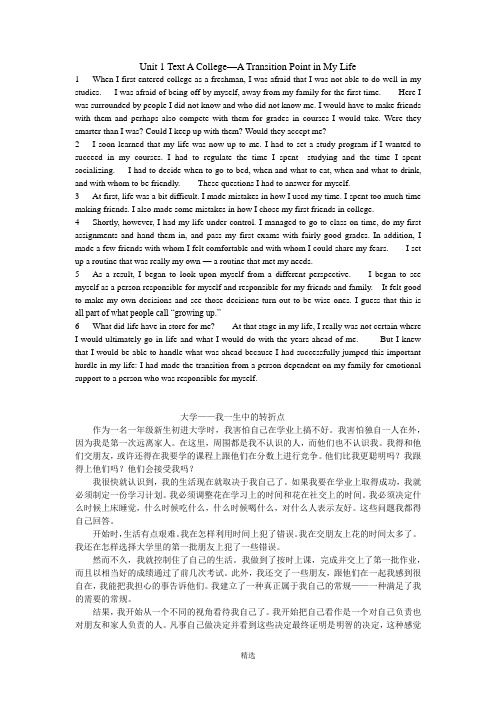
Unit 1 Text A College—A Transition Point in My Life1 When I first entered college as a freshman, I was afraid that I was not able to do well in my studies. I was afraid of being off by myself, away from my family for the first time. Here I was surrounded by people I did not know and who did not know me. I would have to make friends with them and perhaps also compete with them for grades in courses I would take. Were they smarter than I was? Could I keep up with them? Would they accept me?2 I soon learned that my life was now up to me. I had to set a study program if I wanted to succeed in my courses. I had to regulate the time I spent studying and the time I spent socializing. I had to decide when to go to bed, when and what to eat, when and what to drink, and with whom to be friendly. These questions I had to answer for myself.3 At first, life was a bit difficult. I made mistakes in how I used my time. I spent too much time making friends. I also made some mistakes in how I chose my first friends in college.4 Shortly, however, I had my life under control. I managed to go to class on time, do my first assignments and hand them in, and pass my first exams with fairly good grades. In addition, I made a few friends with whom I felt comfortable and with whom I could share my fears. I set up a routine that was really my own — a routine that met my needs.5 As a result, I began to look upon myself from a different perspective. I began to see myself as a person responsible for myself and responsible for my friends and family. It felt good to make my own decisions and see those decisions turn out to be wise ones. I guess that this is all part of what people call “growing up.”6 What did life have in store for me? At that stage in my life, I really was not certain whereI would ultimately go in life and what I would do with the years ahead of me. But I knew that I would be able to handle what was ahead because I had successfully jumped this important hurdle in my life: I had made the transition from a person dependent on my family for emotional support to a person who was responsible for myself.大学——我一生中的转折点作为一名一年级新生初进大学时,我害怕自己在学业上搞不好。
高职国际英语第1册unit1

Chinese customs
Book 1
Unit 1 - People
Warming up
Self-introduction
teacher to the class
student to his/her neighbor
Useful Expressions
How do you do? My name is XXX. Nice to meet you.
Skills
Greeting people for the first time Introducing yourself and others
Saying hello and goodbye
Spelling out names Saying where you’re from
Writing: Filling out forms with personal
Book 1
5. What is the name of the mail order catalogue? Treasurehouse, page 45, unit 3. ________________________________________
6. What is the name of the artist who made the mural in Chinatown? Wing Kei Wong. ________________________________________
Book 1
Unit 1 - People
Brief summary of the unit Warming up Focus People and issues – Text (A) Personal view – Text (B)
高职英语(一)课件Unit 1
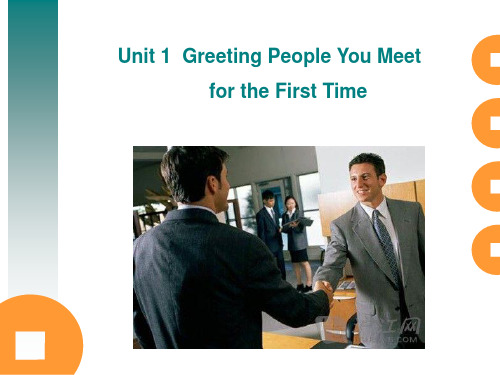
Answer the following questions according to Passage A.
1. Who is introducing the English Professor? Miss Wang, who is the secretary of the English Department.
是的 you here. Lizzy: That’s very kind of you.
为…做好 准备的
Li: You are welcome.
常见英文初次见面习惯用语:
1. Hi. I’m Li Ming. 2. Nice to meet you. 3. How do you do? 4. My name is Li Ming. What’s your name?
专家
11. author
作家
12. a dozen
许多;十二个
13. pleasure
荣幸之事
14. clap
鼓掌
Passage A Welcome
(Miss Wang is the secretary of the English Department. Now she is introducing professor Helen Waters to the students.)
airport.)
海外的
பைடு நூலகம்
Li: Hi, you must be Lizzy. I’m Li Hong from the technical school.
旅途
Lizzy: Oh, how do you do, Li Hong? Thank you for coming to meet me.
高职国际英语1unit

Unit 1 People1.Warming up:Using the phrases “How do you do? My name is .... Nice to meet you.” written on the board.2.Focus:The students are shown pictures of people meeting for the first time. They are also supplied with a dialogue which they can copy to say what they do when they meet somebody for the first time.They join their hands at palms and smile.They shake hands and smile.They bow from the waist and lower their eyes.Ask students to:1)Match nationalities with the pictures: which picture shows an Indianwoman? Which pictures shows two Japanese women? Which picture shows two Americans? Which pictures shows two Chinese men?2)Act out one of these greetings in class. The other students must guess howthey are greeting each other. Are you bowing from the waist and lowering your eyes? Are you shaking hands and smiling?3)Tell how they greet each other? How they greet older people? How theygreet their teachers? How they greet their parents and other relatives? And acting out these different ways for greeting people.3.Text A: greeting and introducing people1)New words reading2)Ask students what they can see in the pictures, how old they think thepeople are, what kind of occasion it could be and if they have a barbecue at home and what they barbecue.3)Ask students to read out the text loud paragraph by paragraph. Collect anywords which students have difficulty pronouncing. Writing these words on the board. Make a list on the board. Then repeat the words.4)Ask students the following questions:How to greet an older person when you meet him for the first time?Do you shake hands with an older person?Do you smile at an older person?How do you introduce yourself to an older person?What do you say to a younger person?How do you introduce somebody else to a younger person?What do you say to somebody you already know?How do you answer a younger person you know who greets you first?5)Pair work as Kate Miller and Sung Ling starting from line 17.6)Page 5-1: read out the sentences and then pair them.7)Page 5-2: check the meaning of the words before doing.4.Background information:1)student exchange: increase student’s understanding and tolerance of other cultures, as well as improving their language skills and broaden their social horizon.2)Barbecue: an outdoor meal, usually a form of social gathering at which meats, fish, or fowl, along with vegetables, are roasted over a wood or charcoal fire. 5.words and expressions:1)exchange partner2)BowThey bowed low to the chairman.He turned and bowed to his boss.Bow and arrowsHe took bow on stage to audience.3)Next-door neighbor4)LimpLimp handshakeShe let her whole body go limp.Mary had twisted her ankle and was limping. 一瘸一拐5)Friend--friendly unfriend--unfriendly--unfriendliness6)Informal--informally--informality7)Short period8)Formal--formally--formality9)Had better do10)Informal formal natural personal professional additional educational musical actual official regional industrial internationalmedical traditional cultural practical Speaking:1.Introducing yourself-let me introduce myself.My name is ...(full name)-Allow me introduce myself, My name is ...(full name)-Hello,I'm ....(full name)-I don't believe we met .I'm.... -Hi,my name is ....(first name) -Good( morning afternoon night …).My name is …(full name). 2.Introducing others-I’d like to introduce you to...-there is someone I’d like you to meet, this is...-Have you met...?3.Saying hello to someone you know 好友见面----Hi! Hello!一般男生想约某个女生(嘿嘿这话有点儿痞)--How you doing~比较熟悉的人见面Hi/Hey只要是朋友都能用的:How's everything? 一切都好?What's up? 近况如何?What's new? 有什么新鲜事?What's happening? 在忙什么?任何时后都可以用,但比较见外: How are you? 你好吗?适用于第一次见面: Nice to meet you. 。
高职国际进阶英语综合教程unit1课文原文和译文

高职国际进阶英语综合教程unit1课文原文和译文Text A Barbecue partySung Ling from Shanghai is staying with her exchange partner, Kate Miller, in San Francisco.On Ling’s first Saturday, the Millers have a barbecue in their garden. They want to introduce Ling to some of their neighbours. Kate also invites some of her friends from school.Before the barbecue, Ling is a little nervous. “What do I say when you introduce me to somebody?” she asks Kate.“Don’t worry, Ling,” Kate says. “It’s very easy. When I introduce you to an older person, for example Grant Summers, our next-door neighbour, I say, ‘Grant, this is Sung Ling from Shanghai. She’s my exchange partner.’ And then I say to you, ‘Ling, this is Grant Summers. He’s our next-door neighbour.’ And you just say, ‘How do you do, Mr Summers? It’s nice to meet you.’”“Yes, but do I shake hands or just smile?”“Well, with an older person you can shake hands and smile. But remember that in America, we like a firm handshake.”“Okay, Kate,” Ling says, “but what about when I want to introduce myself? Maybe you won’t be there.”“Well, if it’s an older person – Grant’s wife, Susan, for example – you just offer your hand and say, ‘How do you do? I’m Sung Ling from Shanghai. I’m Kate’s exchange partner.’”“And what will the other person say?” Ling asks.“Well, the other person will also say ‘How do you do?’ and tell you his or her name.”“Okay. I’ve got that. But what about younger people? You know, your friends from school.”“Well, just say, ‘Hi, I’m Ling, Kate’s exchange partner.’ It’s very informal.”“And what about people I already know?”“Well, if you see somebody you know after a short time, just say ‘Hello.’ But if you see them after a longer time, then you say, ‘How are you?’ or maybe ‘How are things?’”“And what do I answer if somebody greets me with ‘How are you, Ling?’”“Just say ‘Fine, thanks. And you?’ Then the other person says, ‘I’m fine, too. Thanks.’”“Okay. But I thought you said it’s very easy.”译文:上海来的宋玲与她的交换伙伴凯特·米勒一起住在旧金山。
高职国际进阶英语 Unit 1 People 课件

Unit 1 People
Place. Hometown
Focus
I come from ____,the capital of_____province. ______is my hometown. It is a beatutiful small city, and I love it very much. People in my hometown are nice and warm-hearted. I was born in _______. When I was 8 years old, my parents and I moved to______. Welcome to my hometown!
Progressive English for Vocational Colleges Book 1
Unit 1 People
Self Introduction
Good morning dear friends, how are you today? Please allow me to introduce myself. My name is Andy. I‘m 18 years old. I’m energetic and generous. I graduated from No.1 Occupation Technical Secondary School, Kunming. Now I‘m a freshman in Shanghai Institute of Technology. In my spare time, I like playing the piano and dancing. By the way, I like light music as well, it makes me relaxed. To travel around the world is my goal, that’s the reason why I choose cruise service as my major. That‘s all. Thank you!
高职高专实用综合教程英语1unit1-8教案

Unit 1 EducationObjectives:After studying this unit, the students are expected to be able to1.grasp the basic ideas or information about Bill Gates and education abroad;2.understand the main idea of text A and master the useful words, sentences structures & phrases ;3.learn the grammar: nouns;4. read, spell and use the new words and phrases in this unit;5. be well-acquainted with the ways of introducing yourself, introducing someone and responding to introduction;6. practice writing: Introducing YourselfFocuses:1. V ocabulary: (omitted)2. Speaking: the importance of education3. Grammar: nouns4. Practical writing: Introducing YourselfMethods:(1) Listening, Speaking and Reading;(2) Discussion;(3) Presentation;(4) Exercises;(5) Writing.Contents:Step 1. Listening and Speaking & Warm-up DiscussionAsk the students to talk about the importance of education;Step 2. Background Information(1) Bill Gates;(2) Education in China;(3) Education Abroad;(4) Related Words: 大学专科:short 2-3-year higher education重点大学:key university注册人数:enrollment希望工程:Project Hope义务教育:compulsory education普及教育:universal education伙食补助:food allowance学分制:the credit system辅导员:assistant for political and ideological work学生会:students‘ union专业课:specialized course必修课:required / compulsory course选修课:elective / optional course奖学金:scholarship专业:major补考:make-up examination系:departmentStep 3. V ocabulary in Text ALead the Ss to read new words and expressions and then read the new words together. Explain the important language points.1.education n.教育e.g. Children in poor areas receive free education.贫困地区的孩子接受免费教育。
高职高专英语第一册教案:Unit 1 Why English Is So Widely Spread
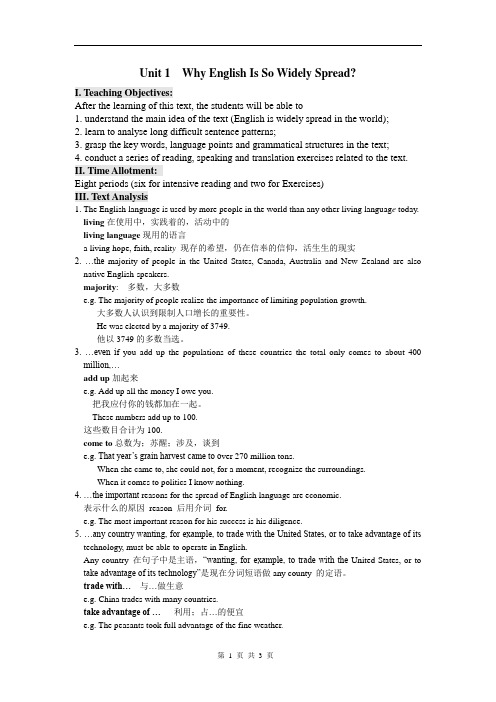
Unit 1 Why English Is So Widely Spread?I. Teaching Objectives:After the learning of this text, the students will be able to1. understand the main idea of the text (English is widely spread in the world);2. learn to analyse long difficult sentence patterns;3. grasp the key words, language points and grammatical structures in the text;4. conduct a series of reading, speaking and translation exercises related to the text. II. Time Allotment:Eight periods (six for intensive reading and two for Exercises)III. Text Analysis1. The English language is used by more people in the world than any other living languag e today. living在使用中,实践着的,活动中的living language现用的语言a living hope, faith, realit y现存的希望,仍在信奉的信仰,活生生的现实2. …the majority of people in the United States, Canada, Australia and New Zealand are also native English-speakers.majority: 多数,大多数e.g. The majority of people realize the importance of limiting population growth.大多数人认识到限制人口增长的重要性。
高职高专实用英语Unit1 Text A

The Action Plan For a Summer Job
1.Have you had a part-time or
vacation job? If yes, what kind of job was it?
worker, seller, waiter, tutor,
attendant……
第四步是利用一切资源来获得理想中的工作。跟你
的父母、长辈、朋友的父母、老师,或你认识的其 他成年人谈谈,看看他们是否跟你想去的公司有联 系。把你的简历给他们。我们称此为建立关系网。 这会为你得到理想工作带来更多机会。
6.The fifth step is to hit the road, read the newspaper want ads, or surf the web. If you don't get any job leads from the fourth step, you have to take action!
不定式充当 句子的表语
为定语从句,修 饰job,省略that
如:The duties of a postman
is to deliver letters and newspapers. 邮递员的任务就是投递信和报纸。
You may not be able to find a job that meets all your
高职国际英语1 unit 1教学文案

高职国际英语1u n i t1Unit 1 People1.Warming up:Using the phrases “How do you do? My name is .... Nice to meet you.”written on the board.2.Focus:The students are shown pictures of people meeting for the first time. They are also supplied with a dialogue which they can copy to say what they do when they meet somebody for the first time.They join their hands at palms and smile.They shake hands and smile.They bow from the waist and lower their eyes.Ask students to:1)Match nationalities with the pictures: which picture shows anIndian woman? Which pictures shows two Japanese women?Which picture shows two Americans? Which pictures shows twoChinese men?2)Act out one of these greetings in class. The other students mustguess how they are greeting each other. Are you bowing from the waist and lowering your eyes? Are you shaking hands and smiling?3)Tell how they greet each other? How they greet older people? Howthey greet their teachers? How they greet their parents and otherrelatives? And acting out these different ways for greeting people.3.Text A: greeting and introducing people1)New words reading2)Ask students what they can see in the pictures, how old they thinkthe people are, what kind of occasion it could be and if they have a barbecue at home and what they barbecue.3)Ask students to read out the text loud paragraph by paragraph.Collect any words which students have difficulty pronouncing.Writing these words on the board. Make a list on the board. Thenrepeat the words.4)Ask students the following questions:How to greet an older person when you meet him for the first time?精品资料Do you shake hands with an older person?Do you smile at an older person?How do you introduce yourself to an older person?What do you say to a younger person?How do you introduce somebody else to a younger person?What do you say to somebody you already know?How do you answer a younger person you know who greets you first?5)Pair work as Kate Miller and Sung Ling starting from line 17.6)Page 5-1: read out the sentences and then pair them.7)Page 5-2: check the meaning of the words before doing.4.Background information:1)student exchange: increase student’s understanding and tolerance of other cultures, as well as improving their language skills and broaden their social horizon.2)Barbecue: an outdoor meal, usually a form of social gathering at which meats, fish, or fowl, along with vegetables, are roasted over a wood or charcoal fire.5.words and expressions:1)exchange partner2)BowThey bowed low to the chairman.He turned and bowed to his boss.Bow and arrowsHe took bow on stage to audience.3)Next-door neighbor4)LimpLimp handshakeShe let her whole body go limp.Mary had twisted her ankle and was limping. 一瘸一拐5)Friend--friendly unfriend--unfriendly--unfriendliness6)Informal--informally--informality7)Short period精品资料8)Formal--formally--formality9)Had better do10)Informal formal natural personal professional additional educational musical actual official regional industrial international medical traditional cultural practical精品资料Page7 listening 1:Before playing the recording get students to read the sentences 1 to 6, first quietly to themselves, then aloud. Make sure that everybody has understood the sentences.Now play the recording and get students to do the exercise. Be prepared to play the recording as often as the students need it. Patrick: good morning. Excuse me, but are you Ms Susan Garner from Chicago, please?Susan: that’s right.Patrick: how do you do, Ms Garner? I’m Patrich Choy. It’s nice to meet you. I’ve come to take you to your hotel.Susan: how do you do, Mr Choy. It’s nice to meet you, too. Look, may i introduce you to one of my colleagues? This is tony Hunter. Tony, this is Patrick Choy. He’s come to take us to our hotel. Tony: Fine. How do you do, Mr Choy? It’s a pleasure to meet you. Patrick: How do you do, Mr Hunter. Welcome to Hongkong. Tony: Thank you. I’ve heard so many good things about Hongkong精品资料that it’s wonderful to be here.Patrick: that’s nice to hear. Now, could you come this way, please? The car’s just outside the building. It’s not far.Ask students to read out the sentences and say whether they are true or false.精品资料Text B: Blind Date1.Background information:1)Blind date: it usually occurs when the two people previously notknowing each other are going out on a date set up by another person who knows both people. Today, most blind dates are n’t totally blind per se, thanks to online social sites such as Facebook and MySpace, where many people have photographs of themselves that are easily accessible by others.2)Geocaching地理寻宝游戏: is a high tech version of hide and seekand an outdoor recreational activity, in which the participants explore the outdoors in search of hidden “treasure” and adventure by using a GPS receiver or mobile device and other navigational techniques.2.Words and expressions:1)Internet dating site2)I could not believe my eyes.3)She began modelling in Paris aged 15.4)Glamour--glamorous5)Suit--suitable6)All the girls fancied him.Linda took quite a fancy to him.What do you fancy doing?I just fancied a drink.7)tongue-tied8) A generous glass of wine一大杯酒; generosity 大量充足精品资料9)Tip the waiter a dollar10)Striped tie条纹领带11)Tie up your shoelaceI tied a knot in the rope.12)i can’t stand.13)Ignore--ignorant--ignorance14)Be in no mood for.../to do...没心情做某事Be in the mood for../to do...有心情做某事Be in a mood情绪不好15)misery--miserable--miserably16)Regret--regrettable--regrettably17)Straight away 马上18)Hopefully 但愿19)Strike up a conversation with sb.搭讪攀谈 strick--struck20)Be in conversation with sb. 正在谈话21)Make conversation 搭话找话说说应酬话精品资料精品资料。
高职国际进阶英语综合教程unit1词汇归纳
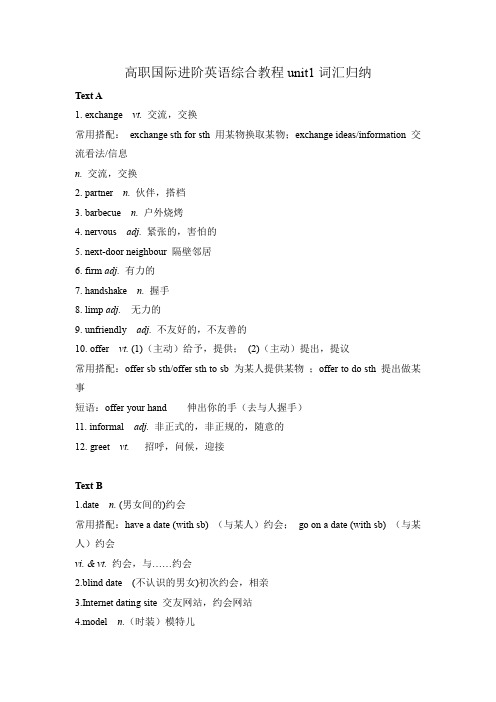
高职国际进阶英语综合教程unit1词汇归纳Text A1. exchange vt.交流,交换常用搭配:exchange sth for sth 用某物换取某物;exchange ideas/information 交流看法/信息n.交流,交换2. partner n.伙伴,搭档3. barbecue n. 户外烧烤4. nervous adj.紧张的,害怕的5. next-door neighbour 隔壁邻居6. firm adj.有力的7. handshake n.握手8. limp adj. 无力的9. unfriendly adj.不友好的,不友善的10. offer vt. (1)(主动)给予,提供;(2)(主动)提出,提议常用搭配:offer sb sth/offer sth to sb 为某人提供某物;offer to do sth 提出做某事短语:offer your hand 伸出你的手(去与人握手)11. informal adj. 非正式的,非正规的,随意的12. greet vt.招呼,问候,迎接Text B1.date n. (男女间的)约会常用搭配:have a date (with sb) (与某人)约会;go on a date (with sb) (与某人)约会vi. & vt.约会,与……约会2.blind date (不认识的男女)初次约会,相亲3.Internet dating site 交友网站,约会网站4.model n.(时装)模特儿5.glamorous adj.富有魅力的,迷人的6.suit n. (男士的)一套外衣,套装,西装7.fancy vt.爱慕,喜爱8.straight away 立刻,马上9.tongue-tied adj.羞窘结舌的,口齿不灵的10.chat vi. & n.聊天,闲聊‘11. impression n.印象,感觉常用搭配:get/have the impression (that ...) 有(……)印象;make an impression on sb 给某人一种印象;give the impression (that ...) 给人的印象是(……)12.rather adv.相当,颇13.generous adj.大量的,丰厚的;慷慨的14.tip n.小费15.mention vt.提及,谈到常用搭配:mention sth to sb 向某人提及某事;it is worth mentioning that ... 值得一提的是……;not to mention ... 更不用说……;Don’t mention it! 不用谢!/不客气!16.look forward to (doing) sth 盼望(做)某事17.awful adj. 糟糕的,可怕的,差劲的18.striped adj.有条纹的,有斑纹的19.ignore vt. 忽视,不顾20.mood n. 心情,心境be in no mood for/ to do sth没心情做某事e.g. He was in no mood to celebrate. 他没心情庆祝。
- 1、下载文档前请自行甄别文档内容的完整性,平台不提供额外的编辑、内容补充、找答案等附加服务。
- 2、"仅部分预览"的文档,不可在线预览部分如存在完整性等问题,可反馈申请退款(可完整预览的文档不适用该条件!)。
- 3、如文档侵犯您的权益,请联系客服反馈,我们会尽快为您处理(人工客服工作时间:9:00-18:30)。
Unit 1 People1.Warming up:Using the phrases “How do you do? My name is .... Nice to meet you.” written on the board.2.Focus:The students are shown pictures of people meeting for the first time. They are also supplied with a dialogue which they can copy to say what they do when they meet somebody for the first time.They join their hands at palms and smile.They shake hands and smile.They bow from the waist and lower their eyes.Ask students to:1)Match nationalities with the pictures: which picture shows an Indianwoman? Which pictures shows two Japanese women? Which picture shows two Americans? Which pictures shows two Chinese men?2)Act out one of these greetings in class. The other students must guess howthey are greeting each other. Are you bowing from the waist and lowering your eyes? Are you shaking hands and smiling?3)Tell how they greet each other? How they greet older people? How theygreet their teachers? How they greet their parents and other relatives? And acting out these different ways for greeting people.3.Text A: greeting and introducing people1)New words reading2)Ask students what they can see in the pictures, how old they think thepeople are, what kind of occasion it could be and if they have a barbecue at home and what they barbecue.3)Ask students to read out the text loud paragraph by paragraph. Collect anywords which students have difficulty pronouncing. Writing these words on the board. Make a list on the board. Then repeat the words.4)Ask students the following questions:How to greet an older person when you meet him for the first time?Do you shake hands with an older person?Do you smile at an older person?How do you introduce yourself to an older person?What do you say to a younger person?How do you introduce somebody else to a younger person?What do you say to somebody you already know?How do you answer a younger person you know who greets you first?5)Pair work as Kate Miller and Sung Ling starting from line 17.6)Page 5-1: read out the sentences and then pair them.7)Page 5-2: check the meaning of the words before doing.4.Background information:1)student exchange: increase student’s understanding and tolerance of other cultures, as well as improving their language skills and broaden their social horizon.2)Barbecue: an outdoor meal, usually a form of social gathering at which meats, fish, or fowl, along with vegetables, are roasted over a wood or charcoal fire.5.words and expressions:1)exchange partner2)BowThey bowed low to the chairman.He turned and bowed to his boss.Bow and arrowsHe took bow on stage to audience.3)Next-door neighbor4)LimpLimp handshakeShe let her whole body go limp.Mary had twisted her ankle and was limping. 一瘸一拐5)Friend--friendly unfriend--unfriendly--unfriendliness6)Informal--informally--informality7)Short period8)Formal--formally--formality9)Had better do10)Informal formal natural personal professional additional educational musical actual official regional industrial international medical traditional cultural practicalSpeaking:Page7 listening 1:Before playing the recording get students to read the sentences 1 to 6, first quietly to themselves, then aloud. Make sure that everybody has understood the sentences.Now play the recording and get students to do the exercise. Be prepared to play the recording as often as the students need it.Patrick: good morning. Excuse me, but are you Ms Susan Garner from Chicago, please?Susan: that’s right.Patrick: how do you do, Ms Garner? I’m Patrich Choy. It’s nice to meet you. I’ve come to take you to your hotel.Susan: how do you do, Mr Choy. It’s nice to meet you, t oo. Look, may i introduce you to one of my colleagues? This is tony Hunter. Tony, this is Patrick Choy. He’s come to take us to our hotel.Tony: Fine. How do you do, Mr Choy? It’s a pleasure to meet you.Patrick: How do you do, Mr Hunter. Welcome to Hongkong.Tony: Thank you. I’ve heard so many good things about Hongkong that it’s wonderful to be here.Patrick: that’s nice to hear. Now, could you come this way, please? The car’s just outside the building. It’s not far.Ask students to read out the sentences and say whether they are true or false. Grammar check: nounsText B: Blind Date1.Background information:1)Blind date: it usually occurs when the two people previously not knowingeach other are going out on a date set up by another person who knows both people. Today, most blind dates are n’t totally blind per se, thanks to online social sites such as Facebook and MySpace, where many people have photographs of themselves that are easily accessible by others.2)Geocaching地理寻宝游戏: is a high tech version of hide and seek and anoutdoor recreational activity, in which the participants explore the outdoors in search of hidden “treasure”and adventure by using a GPS receiver or mobile device and other navigational techniques.2.Words and expressions:1)Internet dating site2)I could not believe my eyes.3)She began modelling in Paris aged 15.4)Glamour--glamorous5)Suit--suitable6)All the girls fancied him.Linda took quite a fancy to him.What do you fancy doing?I just fancied a drink.7)tongue-tied8) A generous glass of wine一大杯酒; generosity 大量充足9)Tip the waiter a dollar10)Striped tie条纹领带11)Tie up your shoelaceI tied a knot in the rope.12)i can’t stand.13)Ignore--ignorant--ignorance14)Be in no mood for.../to do...没心情做某事Be in the mood for../to do...有心情做某事Be in a mood情绪不好15)misery--miserable--miserably16)Regret--regrettable--regrettably17)Straight away 马上18)Hopefully 但愿19)Strike up a conversation with sb.搭讪攀谈strick--struck20)Be in conversation with sb. 正在谈话21)Make conversation 搭话找话说说应酬话3.Text outline:。
